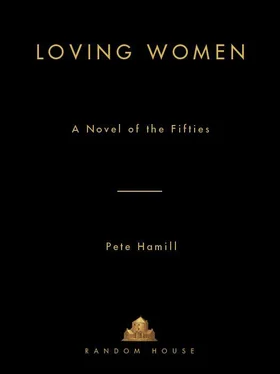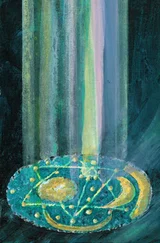One night I told her that I loved her, meaning it, blurting it out. And she smiled and said that was the sweetest thing anyone had said to her in a long long time. I said it again, expecting an echo, and again and again. But all through those first weeks and months, she wouldn’t say that she loved me. She said everything else: You be good, child. You sleep nice, child. You sure are good to me, child. But never I love you, child . And I knew then that this was more complicated than it seemed, that it wasn’t like Steve Canyon or a movie, where you said the words and the women said them back and you lived happily ever after, more or less. She was as close to me as skin to skin, but there were places inside her that I couldn’t touch.
She wouldn’t talk about her life in any detail. If I pressed her, trying to discover where the line was beyond which I could not press, I heard a few things. The most important I learned early on: there was a husband somewhere. She was still married to him, but she said that was just technical. I’m here with you, ain’t I, child? she said and smiled. But after she told me this, there would be times, even when I was with her, when The Boulder would push up and out of me, and I’d ask her why she didn’t just divorce him, this man, this husband, and she’d say, “You can’t divorce a ghost.”
And I would think: The ghost who walks. Like The Phantom in the Sunday Journal-American. Her husband is The Ghost That Walks, this mysterious husband, out there somewhere, haunting us, haunting me, able at any time to come back . Because I could not see him, could not peer into his eyes (as I did with the photographs I now was copying in ink and wash for other sailors at two dollars each), he grew in importance and became more ominous, more of a threat. If I could look into his eyes, I could see whether there was fear there or uncertainty, swagger or evil. But in my mind he had no face and no eyes, and I was afraid of him.
The toughest times were when I was stuck on the base and the worst of all were when I was alone. Eventually I learned the trick of warding off fear with activity: If I just did something, if I got up off the bed or drew pictures in a fury, or ran slowly around the perimeter, I could drive away the phantoms. Sometimes I would simply walk over to the infirmary and hang out with Bobby Bolden or go up to see him in the evenings at the Kingdom of Darkness.
He loved talking about music; he did so with almost ferocious concentration, illustrating the complicated points on his horn. But it wasn’t always just talking. Every week or so, on a night when Eden Santana was working, I’d go down with Bobby Bolden to the black joints around West Cervantes Street. Places with names like Patti’s Bar and the Talk of the Town and the Two Spot and My Club and Mary Lou’s Tavern. They were hot and packed and sweaty, their doors open to the street, ceiling fans churning lamely at the Gulf air, the black faces gleaming in the heat and eyes darting suddenly at me and then at Bobby Bolden and the messcooks who came with us. Almost always there would be a wary, frozen moment, then recognition, and then it would be all right. There were almost never any live bands, but there were jukeboxes. Immense monstrous jukes, the biggest I’d ever seen, with 45s falling steadily off spindles, and bubbles and lights careening through tubes up and down the sides and always some woman with a small waist and a big ass and sturdy legs staring at the lists and someone shouting, “Honey, play B-four.”
“Watch these niggers move,” Bobby Bolden said to me on one of those nights. “Least you might learn to walk better, white man. You aint ever gonna learn to dance.”
The music pounded, the bass lines ramming into me, so that I’d be moving to them the next day and through the night too, moving even with Eden Santana to the dark and dirty song of Cervantes Street. The jukes were loud with a few of the same singers I heard in the Kingdom of Darkness: Lloyd Price, Professor Longhair, Roy Brown. But there were others, too: big-voiced black men, shouters, honkers, bluesmen: Lowell Fulsom, Percy Mayfield, Jimmy Witherspoon, Amos Milburn, Cleanhead Vinson. The names were all as new to me as Hank Williams had been when I landed in Pensacola, and yet I felt as if I now knew Hank Williams, had been drowned in his songs, and now I had to learn about another whole platoon of musicians. Back home, I thought I was hip. Hey, I listened to Sid . I knew Bird from Dizzy. But I’d been suddenly dropped into a world where I didn’t know anything, a dark dense gleaming world, where men at the bar first asked about New York and the Dodgers before asking if I wanted some pussy; big black men, grave men, surly men and sad men. All the while their music was pounding, and I was looking at their women.
“Chick over there got eyes for you,” Bobby Bolden said one night, six of us packed together at the bar of the Two Spot, his nod directed at a girl in a tight yellow dress at a table with two others. “But if her ole man catch you wid her, he cut you three ways, mothafucka: long, deep, and con-tin-uously !”
He laughed and slugged down some beer and I looked at the woman and she looked at me. She had cinnamon skin and full lips, an elegantly thin neck and squared shoulders, and I could see the shape of her full breasts, undressing her with my eyes (taking small short glances, not staring), drawing her in my head, wanting to paint her, wanting to get the color right, wondering all the while what her skin felt like, a black woman’s skin, wondering what color her nipples were and whether the hair on her pussy was straight or kinky and whether she’d laugh at the size of my dick.
“Ever sleep with a colored girl?” Bobby Bolden said.
“No.”
“Shit, you the first white man ever told me the truth on that one.”
“I tell a lie in here, I’m dead,” I said, sipping a beer, thinking of Wajeski’s line: I thought I fucked a colored girl until I saw a colored guy fuck a colored girl . “And I try to do anything about it, I’d be dead before I hit the sidewalk.”
“Here she come.”
The woman had to pass the length of the bar to get to the jukebox. Louis Jordan was singing “Somebody Done Changed the Lock on My Door,” while a half dozen couples danced in a small area behind the juke. The woman stood at the jukebox and slipped in a quarter and started punching tunes. Six of them. Thinking about each one. Standing on one high heel, curling the other foot around her ankle. She had beautiful tapered legs that came right off her ass. I wanted to draw her. No, that was a lie. I wanted to fuck her.
And then thought about Eden Santana. Where was she right then, at exactly that moment, while I stared at the ass of a strange woman? Home, I insisted. In the trailer. Alone. Maybe she was even thinking about me, imagining me in the barracks. She had no way of knowing where I was. And I thought: If I went with this woman, I’d betray Eden . I would be doing to her what I was always afraid Eden might be doing to me. That would be a betrayal. And then thought: No. It wouldn’t be a betrayal because there wasn’t anything to betray. We didn’t have a deal, did we? I’d told Eden I loved her but she’d said nothing back. I was with her when I was with her: that’s what she always said. What I did the rest of the time was my business, right? What she did was her business, too. That’s what she said. But if she knew , what would she think? Probably the same thing I’d think, if she slept with a colored guy. Why was it such a big deal anyway? Skin is skin. White people and black people must have been doing it together for centuries in the South. Otherwise, where’d Bobby Bolden’s green eyes come from? Not from Africa, for shit sure. And this girl at the jukebox, with her light skin: there was some goddamned white in there too.
Читать дальше












